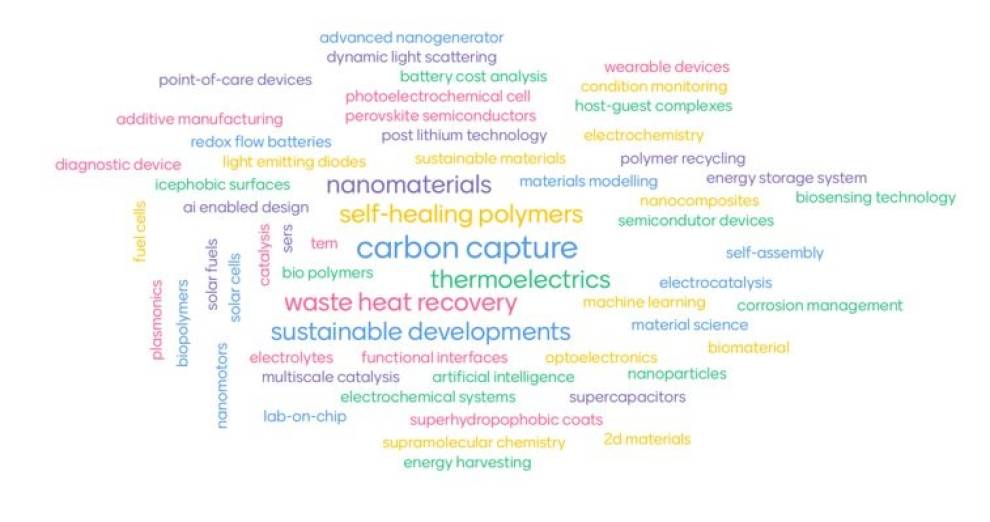Research
A wide range of exciting research topics!

Explore our research staff and research groups below for more information!
Professor Adham Hashibon leads the Data Data-Driventerials Informatics Group that engages in state-of-the-art research into the generation, harvesting, utilisation, and investigation of materials and process data to unravel basic underlying materials behaviour. Advanced computational integrated materials modelling on all scales and Artificial Intelligence (AI) tools including Machine Learning (ML) techniques are utilised across a wide range of applications ranging from materials for energy to structural and functional materials.
Associate Professor Tung Chun Lee leads the Nanomaterials Chemistry Lab that focuses on the (1) design and discovery, (2) fabrication, synthesis and self-assembly and (3) characterisation of exotic nanomaterials and nanodevices for potential applications in photonics, catalysis, sensing, biomedicines, nanomachines and nanotechnology. Ongoing research topics include self-assembly (molecules, polymers and nanoparticles), surface-enhanced Raman spectroscopy SERS, nanoreactors, nanomotors and metamaterials.
The Functional Materials and Energy Device group (FMED) led by Dr Mojtaba Abdi-Jalebi researches the discovery of novel energy materials and advanced energy devices based on low-temperature processable molecular semiconductors and hybrid organic-inorganic heterostructures between such organic semiconductors and inorganic semiconductors, such as metal halide perovskites, metal oxides and nanoparticles.
Dr Buddha Deka Boruah leads the Energy Materials & Storage Systems group (EMS2) that works on the design and synthesis of advanced materials for energy storage systems (conventional and planar designs) including Zn-ion, Li-ion batteries, supercapacitors, photo-charging and chemically self-charging systems.
Dr Bing Li leads the Advanced Biosensing group that studies of chemical and physical properties of advanced nanomaterials for biosensing applications; the assembly of advanced POC/wearable/implantable sensors for biomarker detection and disease diagnosis; and the development of assistive sensing systems for biomedical/surgical applications.
Dr Prospero Taroni-Junior's interests include waste heat recovery using the thermoelectric effect, the development of self-healing polymers, novel approaches for polymer recycling, coatings for ice management, enhancing properties of carbon nanoparticles and new manufacturing processes for metal oxide nanoparticles with controlled shape.
Dr Mingqing Wang's main research direction is on materials deposition and device optimization for renewable energy generation such as transparent conducting oxide electrodes, polymer/CIGS /CZTS/perovskite thin film absorbers, and antireflection layers. She has expanded her research interests on photoelectrochemical water splitting, photodetectors, X-ray detectors, photoelectrochemical biosensors, and active-matrix display by participating in multidiscipline internal and international collaborations.
The Programmable Biomaterials Lab (PBL) led by Dr Hossein Heidari develops innovative solutions in the intersection of spatiotemporally programmable materials, light-based additive manufacturing technologies, and multifunctional models of biological interfaces targeting grand challenges in healthcare and beyond
Dr Zied Hosni is focusing on the combination of machine learning and computational chemistry (DFT calculation and molecular dynamics) for the discovery of a broad range of materials and their properties from small molecules such as drug-like molecules to large molecules such as enzymes (Flap endonuclease) and nanomaterials (carbon nanotubes).
Dr Mengyan Nie's research interests include smart devices for healthcare and condition monitoring of critical engineering components, smart coatings, electrochemical sensing, corrosion management, surface engineering, organic redox flow batteries, hydrogel-based nanogenerators and materials performance testing.
Dr Shahab Akhavan's main research interests include sensors and integrated electronics for applications in smart wearables, industrial sustainability, and environmental monitoring. His research track record encompasses emerging novel nanomaterials, biodegradable devices and electronics manufacturing on flexible and stretchable substrates.
Dr. Thomas Ashton leads the 'Automated Materials Discovery Lab' (AMDL) at UCL East focused on the rapid prototyping of novel materials for a wide range of applications, including next-generation renewable energy technologies and advanced materials for aerospace. Using cutting-edge robotics, machine learning algorithms, and high-throughput experimentation, the lab aims to revolutionize the field of combinatorial materials science and expedite the discovery of future technologies.
Dr. Georgios Nikiforidis's research focuses on Energy Storage Systems, including redox flow, polymer, solid-state, and metal-ion batteries, as well as supercapacitors and biofuel cells. He specializes in electrolyte and electrode design, validation of recycled battery components, and techno-economic analysis of energy storage systems.
Research Partners
The IMD works with partners who are interested in our low-cost, smart, multifunctional and lightweight materials, and we are always looking to grow our network.
Our research partners, both in UCL and externally, have expertise in designing and synthesising materials with well controlled purity, size and composition at a molecular level.
Contact Us
Address:
Bloomsbury:
UCL, Institute for Materials Discovery | 107 Roberts Building | Malet Place | London | WC1E 7JE
Marshgate:
UCL East, Institute for Materials Discovery East | Room 711 Marshgate Building | 7 Sidings Street | Stratford | London | E20 2AE
Telephone:
+44 (0)20 7679 1335
 Close
Close

